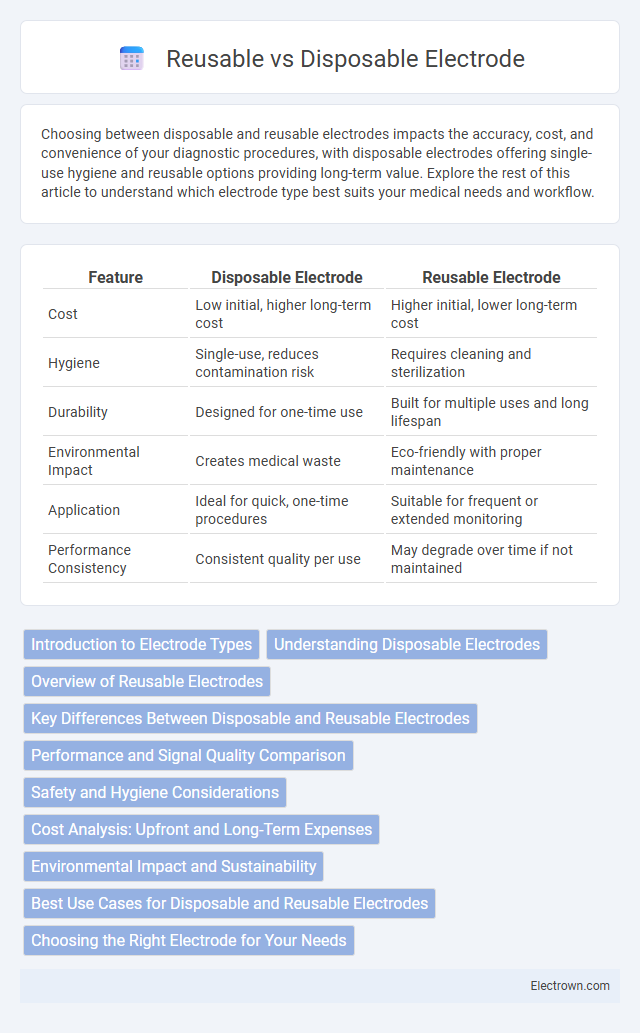Choosing between disposable and reusable electrodes impacts the accuracy, cost, and convenience of your diagnostic procedures, with disposable electrodes offering single-use hygiene and reusable options providing long-term value. Explore the rest of this article to understand which electrode type best suits your medical needs and workflow.
Table of Comparison
| Feature | Disposable Electrode | Reusable Electrode |
|---|---|---|
| Cost | Low initial, higher long-term cost | Higher initial, lower long-term cost |
| Hygiene | Single-use, reduces contamination risk | Requires cleaning and sterilization |
| Durability | Designed for one-time use | Built for multiple uses and long lifespan |
| Environmental Impact | Creates medical waste | Eco-friendly with proper maintenance |
| Application | Ideal for quick, one-time procedures | Suitable for frequent or extended monitoring |
| Performance Consistency | Consistent quality per use | May degrade over time if not maintained |
Introduction to Electrode Types
Disposable electrodes are designed for single-use applications, offering convenience and reduced contamination risks in medical and environmental monitoring. Reusable electrodes, made from durable materials like stainless steel or carbon, provide long-term cost efficiency and consistent performance through multiple uses. Selection depends on factors such as application specificity, budget constraints, and hygiene requirements.
Understanding Disposable Electrodes
Disposable electrodes offer a hygienic and convenient solution for single-use monitoring and treatment, eliminating cross-contamination risks in clinical settings. These electrodes are designed with cost-effective materials and adhesives, ensuring reliable signal quality during brief applications. Understanding disposable electrodes helps you select the right option for efficiency and infection control in medical and research environments.
Overview of Reusable Electrodes
Reusable electrodes offer a durable and cost-effective solution for repeated electrochemical measurements across various applications, such as biosensing and environmental monitoring. Constructed from materials like carbon, gold, or platinum, these electrodes maintain stable performance and can be cleaned and reconditioned multiple times without significant loss of sensitivity. Their sustainability and lower long-term expenses make reusable electrodes a preferred choice in research laboratories and industrial settings requiring consistent data accuracy.
Key Differences Between Disposable and Reusable Electrodes
Disposable electrodes are designed for single-use applications, offering convenience and reducing cross-contamination risks. Reusable electrodes provide long-term cost benefits with durable materials and require regular maintenance to ensure accuracy and performance. Your choice depends on factors like frequency of use, budget, and the need for sterile conditions.
Performance and Signal Quality Comparison
Disposable electrodes often provide consistent signal quality due to their fresh adhesive and minimized cross-contamination risk, ensuring accurate and reliable readings for each use. Reusable electrodes may offer cost-effectiveness and environmental benefits but require proper cleaning and maintenance to maintain optimal performance, as residues and wear can degrade signal quality over time. Your choice between disposable and reusable electrodes should balance the need for precise signal acquisition with practical considerations like budget and hygiene protocols.
Safety and Hygiene Considerations
Disposable electrodes minimize the risk of cross-contamination by ensuring single-patient use, making them ideal for clinical environments where hygiene is critical. Reusable electrodes require thorough cleaning and sterilization protocols to prevent infection transmission, which can be labor-intensive and prone to human error. Proper maintenance of reusable electrodes is essential for patient safety, but disposable options offer a more reliable and convenient solution for infection control.
Cost Analysis: Upfront and Long-Term Expenses
Disposable electrodes require lower initial investment but incur higher long-term costs due to continuous replacement and waste management. Reusable electrodes demand a higher upfront expense but offer significant savings over time by reducing the frequency of purchases and minimizing disposal fees. Analyzing the total cost of ownership reveals that reusable electrodes provide greater economic efficiency in high-usage scenarios.
Environmental Impact and Sustainability
Disposable electrodes generate substantial electronic waste, contributing to landfill overflow and resource depletion due to their single-use nature. Reusable electrodes significantly reduce environmental impact by minimizing waste production and conserving resources through multiple applications. Sustainable healthcare practices prioritize reusable electrodes to lower carbon footprints and promote eco-friendly medical solutions.
Best Use Cases for Disposable and Reusable Electrodes
Disposable electrodes provide optimal hygiene and convenience for single-use applications like sterile medical procedures or short-term physiological monitoring, preventing cross-contamination risks. Reusable electrodes are ideal for long-term or repeated use scenarios such as ongoing cardiac monitoring or physical therapy sessions, offering durable performance and cost efficiency over time. Selecting the right electrode depends on your specific needs for infection control, budget, and frequency of use to ensure accurate and safe signal acquisition.
Choosing the Right Electrode for Your Needs
Choosing the right electrode depends on the frequency of use, budget, and application requirements. Disposable electrodes offer convenience and sterility for single-use scenarios, reducing the risk of contamination, while reusable electrodes provide cost-effectiveness and durability for long-term monitoring. Consider your specific medical or research needs to balance initial investment with maintenance and hygiene factors.
Disposable vs Reusable Electrode Infographic

 electrown.com
electrown.com